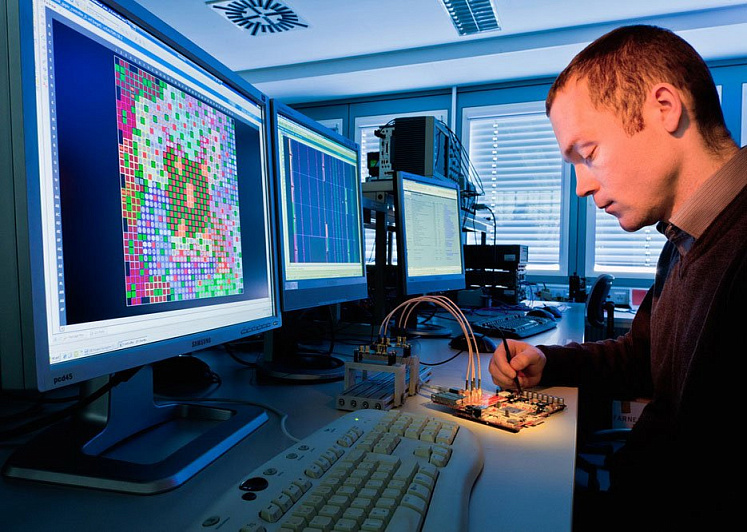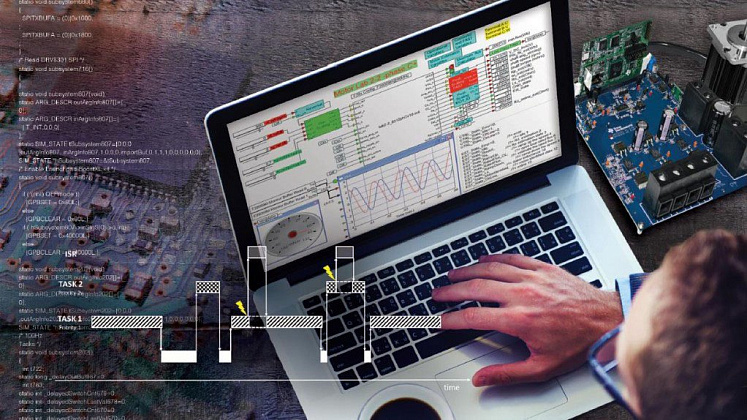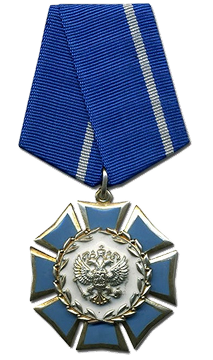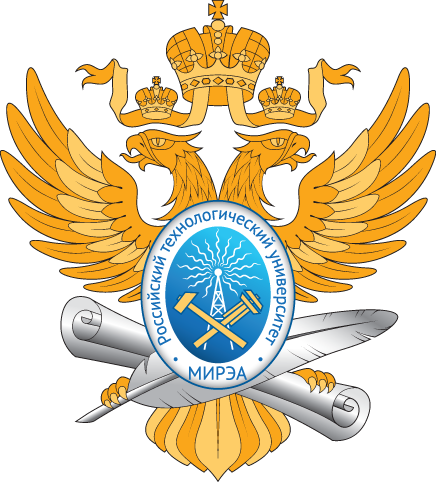09.03.04 Software engineering
The program provides in-depth training of professionals in a wide spectrum of industrial software production technologies for various computer systems, including those designed to implement modern design techniques and tools, and also in the field software lifecycle standards. Students acquire programming skills using various platforms and exploring ways to use and integrate out-of-the-box software components and tools.
Students explore software development techniques and tools, and the lifecycle concept in accordance with Russian and international standards: GOST 34.601-90, ISO/IEC/IEEE 12207:2017 and GOST R ISO/IEC 12207-2010.
Students explore software development techniques and tools, and the lifecycle concept in accordance with Russian and international standards: GOST 34.601-90, ISO/IEC/IEEE 12207:2017 and GOST R ISO/IEC 12207-2010.
Level of education:
Bachelor's degree
Form of training:
Full-time (daytime)
Venue of training:
Moscow
Entrance exams:
— Mathematics (major)
— Russian language
— Information science and ICT
— Russian language
— Information science and ICT
Programs, specializations:
Enterprise resource planning systems (ERP)

The program is designed to train highly qualified professionals in the design, development, implementation, maintenance and operation of corporate management information systems.
Special attention is paid to the best domestic and foreign practices of design, development, implementation and maintenance of customer synchronized resource planning (CSRP) systems, including material requirements planning (MRP) systems, manufacturing resource planning (MRPII) systems, and customer relationship management (CRM) systems.
Special attention is paid to the best domestic and foreign practices of design, development, implementation and maintenance of customer synchronized resource planning (CSRP) systems, including material requirements planning (MRP) systems, manufacturing resource planning (MRPII) systems, and customer relationship management (CRM) systems.
Alumni can be employed as
- 1C ERP specialist
- SAP ERP specialist
- ERP specialist
- software developer
- systems analyst
- ERP programmer
- information systems designer
Program subjects
- Development of enterprise resource management modules
- E-document management systems
- Configuration of enterprise resource management systems
- Mobile applications of enterprise resource management systems
- Customer relationship management systems
- Data warehouses of enterprise resource management systems
- Design of enterprise resource management systems
- Information technology architecture
- Information technology services management
- Enterprise-level information support
- Manufacturing management systems
- Development of cross-platform software systems
Corporate Information Systems Department
Software development and information system design

Students receive theoretical instruction and practical training in software development and operation, and in ways to design an information system as a unity of tools, techniques and personnel to store, process and deliver management data.
Training takes place in computer classrooms equipped with modern hardware, software, and multimedia equipment, and includes studies of the best domestic and foreign practices of industrial software production, subject area modeling and IT system composition design.
Training takes place in computer classrooms equipped with modern hardware, software, and multimedia equipment, and includes studies of the best domestic and foreign practices of industrial software production, subject area modeling and IT system composition design.
Alumni can be employed as
- programmer
- software engineer
- software system design engineer
- developer of information software systems
- software project manager
- systems administrator
- information system designer
Program subjects
- Development of the client components of web resources
- Development of the server components of web resources
- Client-server application development
- Client-server application architecture
- Client-server application transaction processing technologies
- Client-server application virtualization technologies
- Information management of software products and systems
- Simulation of client-server applications
- Jawa software platform templates
- Utility software setup and administration
- Application programming interfaces
- Client-server system design
Software Tools and Applications Department
System and software engineering

Students receive theoretical instruction and practical training in software and system engineering standards, they learn to create and develop complex, multi-version and replicable software tools and databases of high quality and reliability.
The laboratories are equipped with state-of-the-art computer, network, multimedia and office equipment to support the learning process, research projects and one-off developments. Students are provided with opportunities for independent work, including network and system administration.
The laboratories are equipped with state-of-the-art computer, network, multimedia and office equipment to support the learning process, research projects and one-off developments. Students are provided with opportunities for independent work, including network and system administration.
Alumni can be employed as
- software engineer/designer
- software architect
- systems analyst and IT project manager
- information system support and operation engineer
Program subjects
- Mobile operating system architecture
- Mobile application development
- Embedded database management systems for mobile applications
- Justification and development of technical requirements for software systems
- Models, technologies and standards for program interface development
- Evaluation of software system operation parameters
- Mobile application design
- Software standardization and certification
- Maintenance of software systems
- Software systems modeling techniques
- Distributed database management systems
- Development of applications for integrated information platforms
- Internet of Things platforms and applications
Department of Mathematical Support and Standardization of Information Technologies
Decision making support systems

Students receive theoretical instruction and practical training in the development of software based on intellectual methods and approaches which can support decision-making in any subject area.
Studies takes place in a computer center equipped with state-of-the-art hardware and software. Students acquire skills not only in programming, but also in conceptual thinking based on an original methodology of situational analysis and complex system design in any chosen subject area.
Studies takes place in a computer center equipped with state-of-the-art hardware and software. Students acquire skills not only in programming, but also in conceptual thinking based on an original methodology of situational analysis and complex system design in any chosen subject area.
Alumni can be employed as
- programmer
- information support and software engineer
- decision support software engineer
- developer of smart information systems
- software project manager
- software engineer
Program subjects
- Formal language theory
- Decision-making theory
- Multi-agent modeling
- Design of software tools for decision support systems
- Intelligent systems software
- Design of decision support systems
- Neural network design and training
- Development of software platforms for decision support systems
- Expert systems design
- Systems analysis of intelligent system subject areas
- Development and implementation
- Organization of cloud computing
- Learning technologies for intelligent systems
Computer Engineering Department
- Educational Activity
-
Institutes
- Institute of Information Technologies
-
Institute of Artificial Intelligence
- About the Institute
- Institute Administration
- History of the Institute
-
Training programs
- Bachelor's Degree Programs
-
Master's Degree Programs
- 01.04.02 Applied mathematics and information science
- 09.04.01. Informatics and computer engineering
- 12.04.04 Biotechnical systems and technologies
- 15.04.04 Automation of technological processes and production
- 15.04.06 Mechatronics and robotics
- 27.04.03 System analysis and management
- 27.04.04 Engineering system control
- Infrastructure
- Alumni
- Contacts
- Institute for Cybersecurity and Digital Technologies
-
Institute for Advanced Technologies and Industrial Programming
- About the Institute
- Institute Administration
- History of the Institute
-
Training programs
-
Bachelor's Degree Programs
- 09.03.02 Information systems and technologies
- 11.03.04 Electronics and nanoelectronics
- 12.03.05 Laser technology and laser techniques
- 15.03.01 Mechanical engineering
- 22.03.01 Materials science and technology
- 27.03.01 Standardization and metrology
- 28.03.01 Nanotechnology and microsystems engineering
- 29.03.04 Decorative material working techniques
- 54.03.01 Graphic design
-
Master's Degree Programs
- 09.04.02. Information systems and technologies
- 11.04.04 Electronics and nanoelectronics
- 12.04.02 Optical engineering
- 15.04.01 Mechanical engineering
- 22.04.01 Materials science and technology
- 27.04.01 Standardization and metrology
- 29.04.04 Decorative material working techniques
- 54.04.01 Graphic design
-
Bachelor's Degree Programs
- Infrastructure
- Alumni
- Contacts
- Institute of Radio Electronics and Informatics
- Institute of Management Technologies
- Lomonosov Institute of Fine Chemical Technologies
- Institute of International Education
-
Mega-Laboratories
- Motion Capture Laboratory
- Immersive Technologies Laboratory
- Laboratory for the Development and Transfer of Microfluidic Technologies (DTMT)
- Cell Technologies Megalaboratory operating on the basis of the Department of Chemistry and Technology of Biologically Active Compounds, Medical and Organic Chemistry named after N.A. Preobrazhensky
- General Biotechnology Megalaboratory
- Industry 4.0: Digital Robotized Production center
- Laboratory of Intelligent Autonomous and Multi-Agent Robotic Systems
- Research and Educational Center for Biosynthesis, Isolation and Purification of Monoclonal Antibodies (Generium)
- Rare and Precious Metals Research and Technological Center operating on the basis of the Department of Chemistry and Technology of Rare Elements named after K.A. Bolshakov
- Laboratory of Analytic, Modeling, Design and Digital Prototyping Technologies
- Import Substitution of Information Technologies Educational and scientific testing complex
- Smart Production Systems Educational and Scientific Center
- Elastomers. Thermoplastics. Technologies Educational and Research Center operating on the basis of the Department of Chemistry and Technology of Elastomer Processing named after F.F. Koshelev
- Catalytic and Mass Exchange Processes center
- Center of Innovative Technologies in Microelectronics
- Center for Cybersports Robotics
- Mobile Robotics University Laboratory
- Radio electronic Technologies Megalaboratory
- Departmental Situation Center of the Ministry of Science and Higher Education of the Russian Federation for monitoring the sphere of education and science
- Scientific and Educational Center for Medical Radiology and Dosimetry
- Laboratory of Geographic Information Systems and Technologies
- Educational and Research Center for Space Monitoring ("CosMoCenter")
- Additive Polymer Technologies Center
- Cyber Threat Research Megalaboratory
- Digital Center of Rosatom State Corporation
- Laser Technologies Megalaboratory
- Mathematical Modeling and Artificial Intelligence Megalaboratory
- Megalaboratory of Digital and Additive Technologies in Mechanical Engineering
- Nanomaterials and Nanostructures Diagnostics Center
- Techno-coworking
- TESLA Educational and Research Center
- Bachelor's Degree Programs
- Master's Degree Programs
- Additional Education Programs
- Physical Education and Sports
© 2026 MIREA - Russian Technological University




